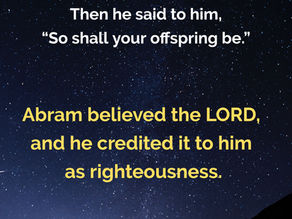Matthew 13:3-9, 23 - Positive Yield
- Alan Salwei
- Aug 8, 2025
- 5 min read
You need to hear the Word AND understand it.

Matthew 13:3-9,23 (NIV)
This week we'll be working our way through various verses in this passage.
3 Then he told them many things in parables, saying: “A farmer went out to sow his seed. 4 As he was scattering the seed, some fell along the path, and the birds came and ate it up. 5 Some fell on rocky places, where it did not have much soil. It sprang up quickly, because the soil was shallow. 6 But when the sun came up, the plants were scorched, and they withered because they had no root. 7 Other seed fell among thorns, which grew up and choked the plants. 8 Still other seed fell on good soil, where it produced a crop—a hundred, sixty or thirty times what was sown. 9 Whoever has ears, let them hear.”
10 The disciples came to him and asked, “Why do you speak to the people in parables?”
11 He replied, “Because the knowledge of the secrets of the kingdom of heaven has been given to you, but not to them. 12 Whoever has will be given more, and they will have an abundance. Whoever does not have, even what they have will be taken from them. 13 This is why I speak to them in parables:
“Though seeing, they do not see;
though hearing, they do not hear or understand.
14 In them is fulfilled the prophecy of Isaiah:
“ ‘You will be ever hearing but never understanding;
you will be ever seeing but never perceiving.
15 For this people’s heart has become calloused;
they hardly hear with their ears,
and they have closed their eyes.
Otherwise they might see with their eyes,
hear with their ears,
understand with their hearts
and turn, and I would heal them.’
16 But blessed are your eyes because they see, and your ears because they hear. 17 For truly I tell you, many prophets and righteous people longed to see what you see but did not see it, and to hear what you hear but did not hear it.
18 “Listen then to what the parable of the sower means: 19 When anyone hears the message about the kingdom and does not understand it, the evil one comes and snatches away what was sown in their heart. This is the seed sown along the path. 20 The seed falling on rocky ground refers to someone who hears the word and at once receives it with joy. 21 But since they have no root, they last only a short time. When trouble or persecution comes because of the word, they quickly fall away. 22 The seed falling among the thorns refers to someone who hears the word, but the worries of this life and the deceitfulness of wealth choke the word, making it unfruitful. 23 But the seed falling on good soil refers to someone who hears the word and understands it. This is the one who produces a crop, yielding a hundred, sixty or thirty times what was sown.”
Canons of Dordt
Point 4 - Irresistible Grace
Article 9: Human Responsibility for Rejecting the Gospel
The fact that many who are called through the ministry of the gospel
do not come and are not brought to conversion
must not be blamed on
the gospel,
nor on Christ, who is offered through the gospel,
nor on God,
who calls them through the gospel
and even bestows various gifts on them,
but on the people themselves who are called.
Some in self-assurance
do not even entertain the Word of life;
others do entertain it but do not take it to heart, and for that reason,
after the fleeting joy of a temporary faith,
they relapse;
others choke the seed of the Word
with the thorns of life’s cares
and with the pleasures of the world and bring forth no fruits.
This our Savior teaches in the parable of the sower (Matt. 13).
Summary
This week are studying the parable of sower. In this parable, Jesus uses four types of soil to describe four different responses to the preaching of the Word of God. Today we turn to the fourth and final soil, the good soil that produced grain.
Jesus described this soil as representing the one who hears the word and understands it. This is the person who will bear fruit.
The yield of this harvest varies from seed to seed, person to person. Some will yield hundredfold, others sixty or thirty. While there are different levels of fruitfulness, the fact that the word was heard and understood makes this good soil.
Dig Deeper
Of the four soils in this parable, this is the only one that yields positive results. The first three soils had some sort of flaw that prevented the seed from producing fruit. Ultimately this is the measure of what is considered good soil: that which produces fruit. Each of the other seeds was either taken away, withered away, or got choked out before it could bear fruit.
Jesus does not condemn the one who produced thirty or sixtyfold for not producing a hundredfold. What distinguishes these soils is not how much fruit they produce, but whether they produce fruit. The determining factor being the soil on which their seed was sown.
This parable contrasts different responses to the preaching of the Word of God. The only response to the word that is presented in a positive light is that which produces fruit for the kingdom. Some will hear the Gospel but will not have it take hold. Others might even show signs of promise yet fail to become rooted in faith. There will also be those who are too consumed in the ways of the world for which the Word of God will not take hold.
The differing responses to the seed show that the issue does not lie with the seed. Those who fail to be fruitful do so because they lack a proper relationship with God. As Paul wrote the Romans in Romans 1:21, “For although they knew God, they neither glorified him as God nor gave thanks to him, but their thinking became futile and their foolish hearts were darkened.”
What we find in the parable of the sower is the difference between knowing about God and truly knowing God. Just knowing about God does not lead to fruitfulness. Only those who are truly rooted in faith will bear fruit for the kingdom. And since this is the measure that Jesus gives, be continually looking for and in prayer for ways to bear fruit for the God’s kingdom.
ACKNOWLEDGE WHO GOD IS: Our Father, who causes His Word to be sown in our hearts;
ALIGN YOUR LIFE WITH GOD'S WILL: Pray that not only will you hear the Word of God, but that you'll understand it and produce a crop (bear fruit);
ASK GOD FOR WHAT YOU NEED:
Read the New Testament in a year! Today: 1 Corinthians 7



















Comments